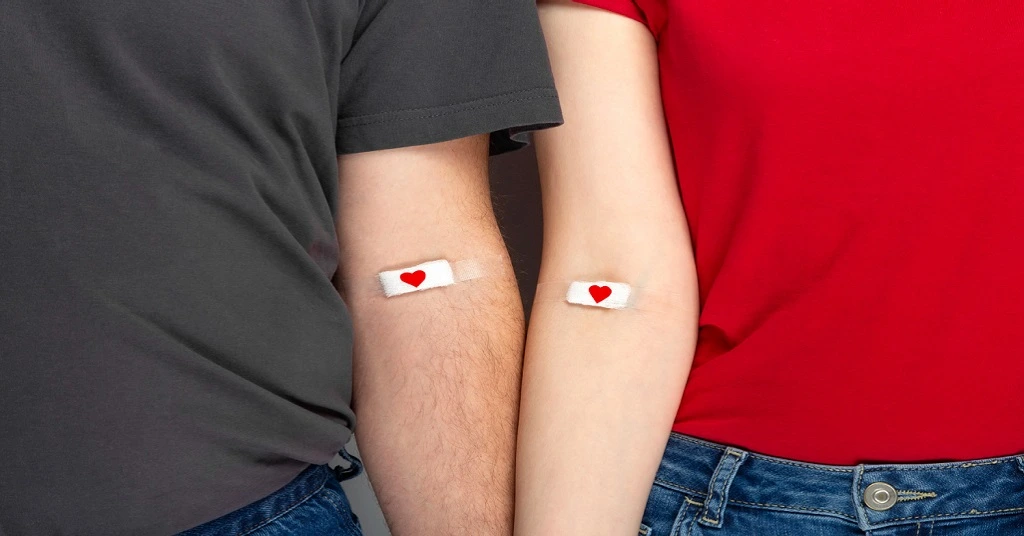Dating with syphilis can feel like walking a tightrope between fear and hope, uncertain of how a partner will respond to your truth.
Although syphilis can be treated, it comes with challenges, including the emotional burden of disclosure and the need to approach intimacy with caution.
What is syphilis?
Syphilis is a sexually transmitted infection (STI) caused by the bacterium Treponema pallidum. You can contract it through oral, anal, or vaginal sex, and it can also be passed from an infected mother to her baby during pregnancy or childbirth, leading to congenital syphilis.
If left untreated, syphilis progresses through four stages, each with different symptoms and risks
Primary stage
The primary stage of syphilis is marked by the appearance of a single and painless sore called a chancre at the site of infection. This sore typically appears 3 weeks after exposure and can last for 3 to 6 weeks. Although the sore heals on its own, the infection remains in the body, making it important to seek treatment before progressing to the next stage.
Secondary stage
During the secondary stage, syphilis spreads through the bloodstream, leading to symptoms like:
- Skin rashes (often on the palms of the hands and soles of the feet)
- Sores in mucous membranes
- Fever
- Swollen lymph nodes
- Sore throat
These symptoms can come and go, but the infection is still active and highly contagious during this stage.
Latent stage
If syphilis is not treated, it enters the latent stage, where no symptoms are visible, and the infection becomes dormant. This stage can last for years, with the bacteria hidden in the body, but it remains infectious to others in the early part of the latent phase. While no symptoms appear, the infection is still present and can be detected with blood tests.
Tertiary stage
The tertiary stage occurs in about 15% to 30% of people who don’t receive treatment for syphilis. This stage can happen years after the initial infection and can cause severe damage to vital organs, including the following:
- Heart
- Brain
- Nerves
This stage can lead to complications like:
- Blindness
- Dementia
- Cardiovascular problems

How does syphilis affect your dating life?
Dating with syphilis comes with its own set of challenges that can affect emotional well-being and intimacy. Here are the main ways syphilis can impact your dating life:
Emotional stress and fear of disclosure
Telling a potential partner about your syphilis diagnosis can feel overwhelming and the fear of rejection or judgment may make you anxious to start the conversation.
Worse, this might even make you hesitant to date and turn relationships into a source of worry rather than enjoyment.
Navigating intimacy with health considerations
Building intimacy requires open communication and thoughtful decisions about health and safety.
If you have syphilis, you need to take steps to protect yourself and your partner during sexual activity. This means doing the following:
- Discussing safe sex practices
- Updating them on your treatment progress
- Deciding when it is safe to resume intimacy
Managing the impact on relationship dynamics
Having syphilis can influence how your relationship progresses especially in terms of physical intimacy. You and your partner may need to adapt how you connect both emotionally and physically. While this requires patience and understanding, making these adjustments can build deeper trust and improve communication.
How can you inform your partner?
Disclosing your syphilis status to a partner is an important step in maintaining trust, ensuring safety, and fostering a healthy relationship. It requires careful timing, honesty, and effective communication.
Here’s how to navigate the process:
Find the right timing
Disclosing your syphilis status early helps build trust and allows both you and your partner to make informed choices. Being open about your condition shows responsibility for both your health and theirs, which creates the foundation for a supportive and safe relationship.
Be honest
When you share the details honestly, your partner can make informed choices about their health. This transparency strengthens trust and allows both of you to manage your relationship responsibly.
Use effective communication strategies for disclosure
Practice your message beforehand, so you can convey the information clearly and confidently. Anticipate questions your partner may have and prepare to respond with accurate and informed answers.
Emphasize that syphilis is treatable and manageable, which can ease fears, reduce stigma, and make the conversation feel more supportive.
What precautions should you take to protect your partner?
Here are some key measures to consider to protect your partner if you have syphilis:
- Use condoms consistently.
- Adhere to your treatment plan.
- Maintain an honest and open communication about the following:
- Your health status
- Treatment progress
- Sexual practices
What do you do if you’re rejected due to your condition?
Handling rejection after sharing your syphilis status can be difficult, but remember that it often comes from misinformation, not a reflection of your worth. Recognizing this helps you respond with empathy and patience.
Here’s what you can do if you’re rejected:
- Prioritize self-care
- Lean on friends, family, or support groups for emotional support
- Allow yourself time to process your feelings
&nsbp;
Taking this approach strengthens your resilience, preserves your dignity, and helps you move forward with confidence.
Is a long-term relationship with syphilis possible?
Yes, as long as you and your partner work together. Managing a long-term relationship with syphilis requires ongoing, honest communication and shared responsibility for health. Both of you should commit to following treatment plans and practicing safe sex to protect each other.
Frequently asked questions
How should you disclose syphilis status to a potential partner?
Disclosing a syphilis status requires honesty and timing. Choose a private moment to discuss this, focusing on facts, how you’re managing the condition, and the importance of safety and consent in your relationship.
Can syphilis be transmitted even if you’re undergoing treatment?
Yes, syphilis can be transmitted to others until treatment is fully completed and a healthcare provider confirms the infection is cured. Safe sexual practices are crucial during this period.
What precautions should be taken when dating with syphilis?
When dating with syphilis, engaging in safe sexual practices, undergoing complete treatment, and regularly consulting healthcare providers are essential steps to protect yourself and your partner.
Is it safe to start a new relationship if you have syphilis?
Starting a new relationship is safe as long as you communicate your health status openly, follow treatment plans diligently, and practice safe sex to prevent transmission.
How does syphilis affect a relationship?
Syphilis can challenge a relationship through the need for open communication, treatment, and adjustments in sexual activity. However, with mutual support and understanding, relationships can remain strong and healthy.
Key takeaway
Managing syphilis in a relationship may seem challenging, but with open communication, mutual support, and a shared commitment to health, it’s absolutely possible to maintain a strong and thriving connection.




















































